A couple of years back, when Wizards of the Coast released 3rd Edition of D&D, they not only updated the famous franchise, but they also gave us the Open Gaming License. For the first time, you could create new games, adventures, supplements based on the d20 System without special approval from the creators of D&D.
In a way this helped resurrect the RPG industry. A lot of new companies appeared and produced products using the d20 System back then and over the following years more companies jumped the OGL bandwagon by releasing their game rules under the OGL.
So, what other games are currently available under the OGL? In the last days I had done some research, since I initially planned to use an OGL game for my Ad Astra campaign before I settled for Savage Worlds instead.
Here’s what I’ve found:
D&D 3.5 (as Revised 3.5 SRD)
Of course not everything contained in the D&D 3.5 rulebooks is open content, but the majority of the rules, classes, monsters and spells is included in the Revised 3.5 SRD (SRD stands for System Reference Document).
The SRD is actually still available from the WotC website in RTF format. My favorite version of this document is the website “The Hypertext d20 SRD“.
d20 Modern (as SRD Modern)
D20 Modern was a pretty cool game, in many part IMHO even better than D&D itself. Alas WotC treated d20 Modern a bit like an unwanted stepchild and support stopped a few years ago, with no updated version in sight.
The d20 Modern SRD can still be downloaded from the WoTC site in RTF format. There are also a couple of PDF versions floating around the net, including the very good looking Modern d20 Core Kit from RPGObjects.
FUDGE
FUDGE always had a pretty open license even back in 1995, long before the OGL. Pretty recently Grey Ghost Press decided to release FUDGE under the OGL, too. So, what kind of game is FUDGE? If you ask me, it’s not a game at all but more like a toolbox for creating your own RPG.
You get a pretty simple basic mechanic using Fudge dice (six-sided dice with two blank sides, two sides with “-” and two sides with “+” on it) and a lot of optional rules. You can even easily introduce concepts from other games to FUDGE. The FUDGE SRD is available as RTF from Grey Ghost Press here.
FATE
Perhaps you’ve already read about “Spirit of the Century“, the pulp RPG by Evil Hat Productions that has been praised by gamers and critics alike. SotC is based on the FATE RPG which itself was based on FUDGE. So, when FUDGE was released under the OGL, Evil Hat jumped the bandwagon and made FATE 2nd Edition and 3rd Edition (which is used for SotC and the upcoming Dresden Files RPG) available under the OGL, too.
If you are interested in learning more about FATE (at least the 2nd Edition), check out my review. You can download the FATE 2nd Edition rules and the SotC SRD on the official FATE website.
The Action! System
The Action! system is Gold Rush Games‘ version of the FUZION system that was as far as I know one of the first free systems on the internet. FUZION is a combination of the Interlock and the HERO system. The Action! system that is available under the OGL is supposedly 95% compatible to the FUZION system. Alas the Gold Rush Games’ site is more or less down and a couple of links on the official Action System site are dead as well. But I could find a HTML version of the SRD (which also removed all trademarked content) here.
BESM d20 (as Anime d20 SRD)
Big Eyes Small Mouth was the anime-inpired roleplaying game created by Guardian of Order. BESM d20 was their try to tap into the d20 market. Although I prefer the Tri-Stat version of BESM, the d20 variant has its charm. One of the highlights is the fact that GoO reverse-engineered the standard d20 classes and by doing so created a point-based system to create custom classes. Even if you don’t care for anime, this aspect of BESM d20 makes it very interesting. Alas GoO is out of business and as far as I know there was no support for BESM d20 aside from a Slayers setting. But you can still get the Anime d20 SRD here.
This concludes part 1 of my look at the different games released under the OGL. There are still a few more systems to write about in my next post of this series. So, what are your thoughts about the games I mentioned so far? As always I am very interested in your comments!

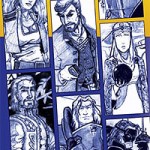
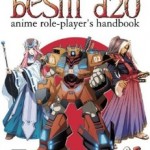
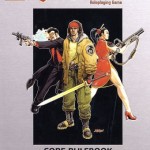
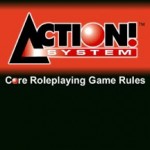
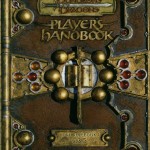
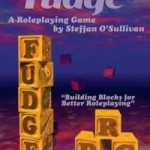
I was really impressed with the Fudge rules I got back in the nineties: "1. Copies of all or portions of FUDGEmay be made for your own use and for distribution to others, provided that you do not charge any fee for such copies […]. 2. You may create derivative works such as additional rules and game scenarios and supplements based on FUDGE, provided that (i) such derivative works are for your own use or for distribution without charge, or for publication in a magazine or other periodical […]." At the time I was unaware that the non-commercial element might be a hindrance. I just thought, "Wow, it's free!"
BESM keeps popping up every now and then because somehow I ended up with Uresia: Grave of Heaven by S. John Ross on my wishlist (can I put links into these comments?); see the Blue Lamp Road wesite. And Tékumel: Empire of the Petal Throne uses the Guardians of Order's Tri-Stat rules as well. Both of these don't point towards BESM d20, however.
.-= Alex Schröder´s last blog ..Resource Management using a d6 =-.
There are some interests SRDs beyond these you talk. Like the D6 SRD [is Alive!! Alive!!]and other indies RPGs..
.-= Shingo watanabe´s last blog ..Battlestar Galáctica: Viper MKVII para RPGQuest =-.
Sure, I know. That's why it's part 1 of a series. I didn't want to cram all that SRD goodness into one post. 🙂
Yeah!! So this is a marketing trick… hahaha.
Hugs
.-= Shingo watanabe´s last blog ..Holy Avenger VR Gratuitos para Download =-.
I loved Action! and worked on a good magic system for it. I wanted a kit similar to the Hero System, but not as detailed. I though about using EABA, but in the end, I just couldn't come up with anything useful.
Someone eventually came up with a system and sold it under Comstar Games. If I can find it again, I'll post the link. In comstar games forums, the author posted an abbreviated format that used advantages to build individual spells.
The thing about Action! that I really likes was that you could start with a stated horse (STR 11) and scale up to compute horsepower for engines. It scaled really well.
Look forward to the rest of the series.
You're missing perhaps one of the best of the OGL systems out there. Spycraft was originally part of AEG but came under Crafty's control when they split from AEG. Many of the ideas within its covers showed up in other games like Action Dice. The game has continued strong and Crafty will be debuting their contribution to the Fantasy market with FantasyCraft which will debut their more simplified MasterCraft system. Also, they have released several items in pdf which are revolutionary in their ease & simplicity to use.
@Desertpuma: I only listed games that come with their own SRD. If I listed every system/game/supplement released under the OGL, I could rename my blog to Stargazer's World of OGL products. 😉
But if there's a SpyCraft SRD, I will gladly post about it in a follow-up post.